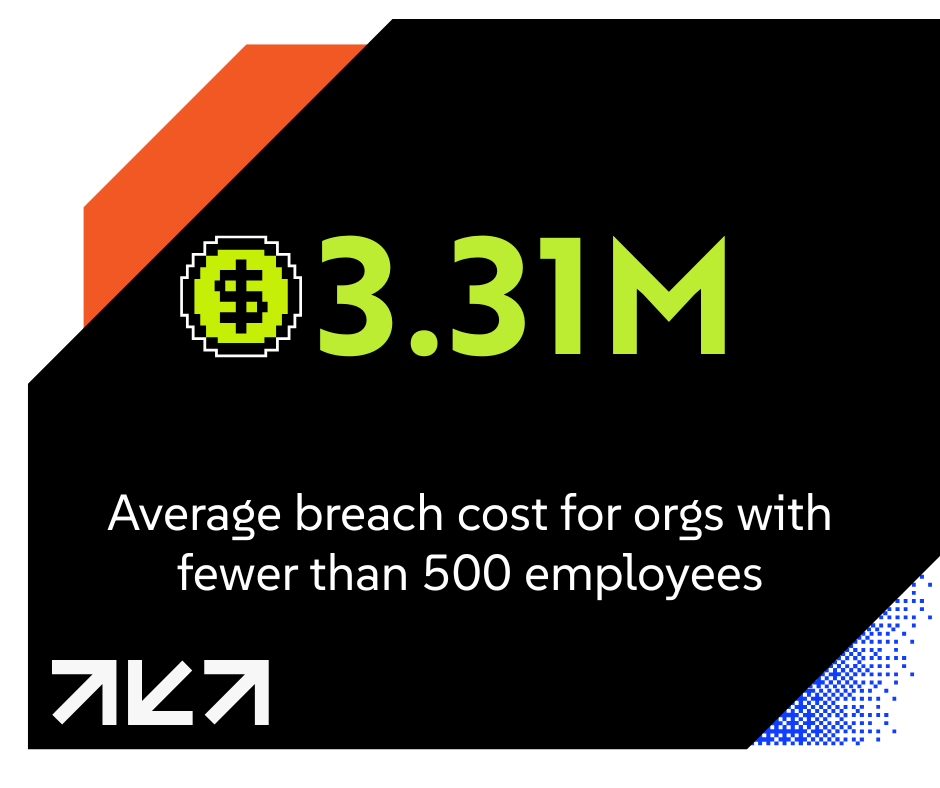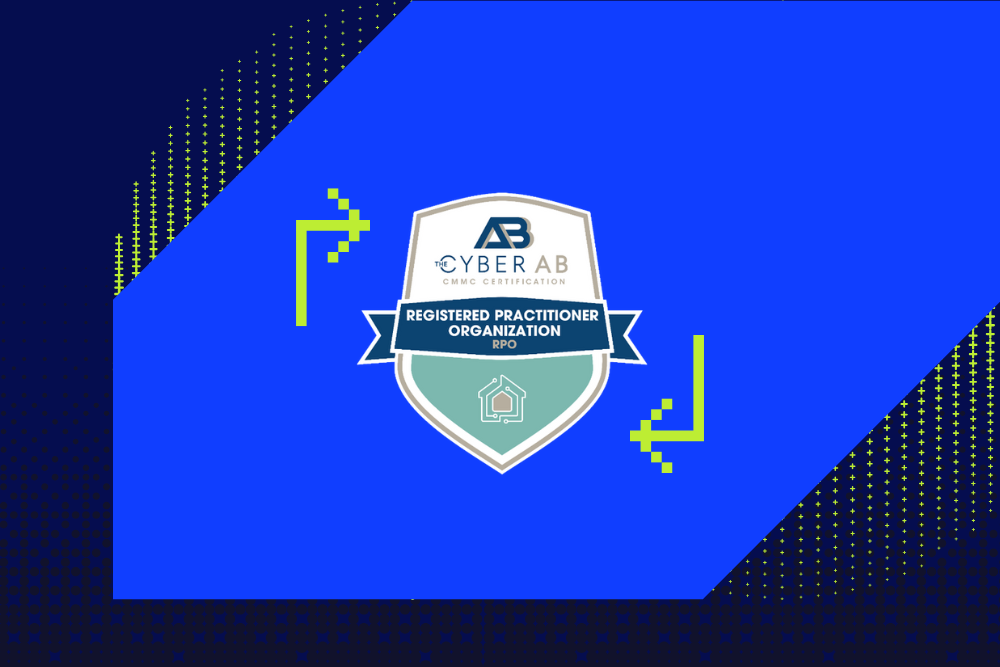Why Cyber Insurance Matters More Than Ever
Imagine waking up to find your systems locked, your customer data stolen, and your operations frozen. For a small to mid-sized business leader, this is no longer a hypothetical worst-case scenario; it’s a growing reality. Cyber attacks hit fast, cost millions, and bring operations to a standstill. Yet only 23% of small businesses feel confident in their ability to identify threats.
These threats pose one of the most significant and misunderstood risks to the business. A small business with minimal security is what cybercriminals quite literally bank on.
A CISO's Perspective on Risk, Cost, and Compliance
The $3 Million Oversight: Why Cybercriminals Love Small Businesses
The First 72 Hours After a Breach: The Most Expensive Days of Your Career
When One Phishing Email Takes Down The Whole Company
The Benefits of a Cyber Insurance Policy: A CFO/COO's View
What Does Cyber Insurance Cover?
Before You Sign: Key Components of a Cyber Insurance Policy
Why Cyber Insurance Is Getting More Expensive and Harder to Get
The CISO–CFO Partnership Is Your Strongest Defense Against Cyber Risks
Ask the CISO: Cyber Insurance FAQs Every CFO Needs to Read
Why Cyber Insurance Matters More Than Ever
Imagine waking up to find your systems locked, your customer data stolen, and your operations frozen. For a small to mid-sized business leader, this is no longer a hypothetical worst-case scenario; it’s a growing reality. Cyber attacks hit fast, cost millions, and bring operations to a standstill. Yet only 23% of small businesses feel confident in their ability to identify threats.
These threats pose one of the most significant and misunderstood risks to the business. A small business with minimal security is what cybercriminals quite literally bank on.
A CISO's Perspective on Risk, Cost, and Compliance
A company’s security team, whether internal or external, manages the technical defenses. They handle the firewalls, alerts, and threat hunting. But the CFO and COO manage the balance sheet, the P&L, and the operational stability of the entire company.
A direct conversation about cyber risk is necessary because a major incident is not a technical problem. It is a financial one.
The concern is not just a "hacker." The concern for a financial or operational leader is compliance exposure (the fines) and operational stability (the crippling cost of downtime).
The cost of a major incident is unpredictable, catastrophic, and immediate. There is, however, a tool that can turn this unknown, potentially company-ending cost into a predictable, manageable, budgeted line item.
That tool is cyber insurance.
You Can’t Predict a Breach, but You Can Budget for It
A business does not buy fire insurance hoping to use it. It buys fire insurance to ensure the company survives if the worst happens. Cyber insurance is no different. In fact, it is one of the most likely "fire" scenarios a small business faces.
Let's be clear: Cyber insurance does not stop an attack. Proactive security work does that. But insurance can save the company when a sophisticated attack gets through. It helps the business recover faster and avoid financial ruin when a dumpster fire ignites.
This article walks you through what cyber insurance is, why it matters for small businesses, what it does and does not cover, and what a policy actually does for the P&L.
What Is Cyber Insurance?
From a financial perspective, cyber insurance is a risk transfer mechanism. That's it. It’s a policy designed to help a business manage the massive and immediate expenses tied to a data breach or cyber attack.
When discussing "expenses," this does not mean the cost of new laptops. This refers to a flood of unbudgeted, emergency costs that all hit the P&L at once.
The $3 Million Oversight: Why Cybercriminals Love Small Businesses
Hackers love small to mid-sized businesses. They are big enough to have valuable data and money, but often they often lack the massive security budget of a Fortune 500 company. This makes them the perfect target. When 43% of cybercriminals target small businesses, you need protection. Without coverage, the expenses fall on you.
According to a 2024 IBM Security report, the average cost of a data breach for small and mid-sized businesses was around $3 million. That’s not pocket change. For smaller companies, an event like this can put you out of business.

The First 72 Hours After a Breach: The Most Expensive Days of Your Career
Here are some of the invoices that land on a CFO's desk in the first 72 hours after a major breach:
- Legal Fees: The company needs external counsel immediately to advise on legal obligations.
- IT Forensics: A specialized firm has to step in to determine what happened, what data was stolen, and how to stop the bleeding. Their retainers are not cheap.
- Customer Notifications: The business may be legally required to notify every customer. The cost of printing, postage, and call center support adds up fast.
- Ransom Payments: This is the one everyone fears. If a ransomware attack locks up operations, the leadership team faces a terrible choice.
- Lost Income: This is the COO's world. Every minute the company's systems are down a minute of lost sales, delayed product shipments, and inability to bill clients.
Also known as cybersecurity insurance or cyber liability insurance, this policy acts as a financial buffer. It’s a contract that states if this specific catastrophe happens to your company, the insurer will step in to pay for the cleanup, hire the experts, and cover the losses so you can keep the business running.
When One Phishing Email Takes Down The Whole Company
The Realistic Attack Scenario Every CFO Should Understand
Consider this scenario: An employee in finance clicks on a phishing email. It looks legitimate. Nothing obvious happens. But in the background, hackers now have access to your network. They watch the company for weeks. They learn about its systems, find its customer database, and locate its financial records.
Then, on a Friday night before a long weekend, they strike. They deploy ransomware.
On Saturday morning, nobody can log in. The company's systems are frozen. Customer data is inaccessible, and a ransom note appears for $1 million in Bitcoin, payable in 48 hours.
What happens next?
- The Crisis Call: The IT team confirms the attack and begins triage.
- The First Financial Hit: An external incident response team steps in. Their emergency retainer alone is $100,000.
- The Operational Halt: The COO realizes the company cannot ship products, process orders, or access its ERP. The business is at a complete standstill. Every hour of downtime costs thousands in lost revenue.
- The Legal Ticking Clock: The company lawyer informs leadership that if customer data was stolen (and they must assume it was), the business has 72 hours to notify regulators under laws like GDPR or CCPA. The fines for failure are steep.
- The Impossible Decision: The CEO and CFO now have to decide: To pay or not to pay the $1 million ransom? There is no guarantee it will even work.
A few years ago, companies might have been able to brush off this cyber attack. Today, it’s a business owner’s worst nightmare.
Now, let's replay that same scenario, but with a good cyber insurance policy.
When Cyber Insurance Contains A Million-Dollar Problem
On Saturday morning, the leadership team makes one critical call: to the cyber insurer's 24/7 breach hotline. Instantly, things change:
- Access to Experts: The insurer connects the company with a pre-vetted, best-in-class IT forensics firm. The cost is covered.
- Legal Guidance: The insurer provides a “breach coach” (i.e. expert lawyer) to manage the legal response at no additional cost.
- The Ransom Dilemma: The insurer brings in professional negotiators. They know these hacker groups. They handle the negotiation. If the company decides to pay, the ransom payment is covered.
- Operational Recovery: The policy includes business interruption coverage. This means the policy covers income lost during downtime.
- The Cleanup: The cost to restore data, notify customers, and even hire a PR firm to manage the company's reputation? All covered, up to the policy limit.
The event is still a crisis, but it is no longer a financial catastrophe. The small business has a team of experts on its side, and the unpredictable, seven-figure cost is contained.
The Benefits of a Cyber Insurance Policy: A CFO/COO's View
For a small business leader, the benefits of cyber insurance translate directly to financial and operational stability.
Financial Protection
Having a cyber insurance policy takes you from catastrophic OpEx to a predictable budget. A breach triggers a sudden, unplanned strain on operating expenses. Cyber insurance turns unpredictable, sky-high risks into a manageable, fixed expense: your annual premium. A CFO can budget for the premium. A CFO cannot budget for a $3 million random event.
Access to Experts
When a breach hits, time is the enemy. A small business cannot afford to spend three days vetting forensic investigators and law firms. A good policy gives the company 24/7 access to a panel of elite, pre-vetted specialists. The insurer has already negotiated its rates. The small business gets an "A-Team" on its side, instantly, without a massive upfront retainer.
Faster Recovery
This is the COO's #1 metric. Downtime is death for a growing business. The faster the company recovers, the smaller the hit it takes. The experts the insurer provides are focused on one thing: getting the business back to "normal" safely and quickly. The policy's business interruption coverage protects the P&L from the revenue lost while the company is down.
Due Diligence Demonstration
Sure, cyber insurance offers peace of mind, but more importantly, it proves you have your bases covered. As C-suite members of the company, small business leaders have a duty of care. Having a comprehensive risk management plan that includes cyber insurance shows the board, investors, and auditors that the leadership team takes this threat seriously.
Credibility with Clients & Partners
Large enterprise clients have increasingly made cyber insurance a contractual requirement to do business with them. They know that if their small business vendor has a breach, it could impact their supply chain. A cyber insurance policy is their assurance that the business can survive an incident and continue to serve them.
Improved Security Posture
Cyber insurance companies do not want to insure a high-risk business. Before they provide a policy, they will assess the company's current cybersecurity practices. This application process forces your business to implement basic security measures like multi-factor authentication (MFA) and cyberawareness training for employees.
What Does Cyber Insurance Cover?
Coverage can vary by policy, but most include two main categories. You can think of these as costs tied directly to your own recovery and costs tied to your legal responsibility to others.
First-Party Coverage
This part of the policy covers the direct losses a business incurs.
- IT Forensics: Covers the cost of the high-priced investigators needed to determine what happened.
- Data Restoration: Pays to recover or replace lost or damaged data from backups.
- Business Interruption: Reimburses a company for lost income and extra expenses incurred during the downtime. This is often the most valuable coverage for a small business.
- Ransomware Payments: Covers the ransom payment and the cost of the professional negotiators.
- Notification Costs: Handles the administrative expenses of informing everyone affected.
- Public Relations: Pays for a crisis PR firm to manage a company’s reputation.
Third-Party Coverage
This component covers your liability to other parties, like customers or partners, who were affected by the breach. Third-party coverage helps protect you from these claims.
- Legal Defense Costs: Pays for lawyers to defend the company against lawsuits.
- Settlements and Judgments: Covers the costs of settlements or court-awarded damages.
- Regulatory Fines: If a company violated GDPR, CCPA, HIPAA, or another data protection law, the fines can be massive. This coverage helps pay those penalties.
Read The Fine Print: What Cyber Insurance Companies Don’t Cover
This is a critical area for any business leader to understand. An insurance policy is a contract built on exclusions. It is not a "get out of jail free" card.
Cyber insurance companies expect a business to do its part. If a company neglects basic cybersecurity measures, the insurer can deny the claim.
Common exclusions include:
- Pre-existing Vulnerabilities: If a company knew about a critical security flaw, failed to patch it, and that flaw was the cause of the breach, the insurer will likely deny the claim.
- Insider Threats: If a disgruntled employee intentionally steals data, this is often excluded (this falls under a different policy, like a crime bond).
- State-Sponsored Attacks: Many policies exclude "acts of war" or terrorism.
- Third-Party Failures: If a data breach originates from one of the company's vendors, the policy may not cover the losses.
- Hardware Damage: If the attack physically destroys servers, the policy won't pay to replace the server itself. That physical loss falls under commercial property insurance. However, the cyber insurance policy will cover the cost of restoring the data on that server.
Always read the fine print. Every policy has limits and not knowing what’s excluded leads to unwanted surprises. That's the last thing you need when dealing with a cyber incident.
Before You Sign: Key Components of a Cyber Insurance Policy
When you shop for coverage, be sure to review these specific terms.
- Coverage Limits: The maximum amount the insurer will pay. This limit should be based on a realistic risk model: What is the maximum cost of downtime? How many customer records does a company need to protect?
- Deductible (or "Retention"): This is the classic CFO dilemma: How much is the business willing to cover out of pocket before insurance takes over? A higher deductible reduces the premium but means the company absorbs the initial portion of the loss.
- Incident Response Support: Does the policy require the use of the insurer's pre-approved panel of experts? Or does the business have a choice of counsel?
- Regulatory Coverage: Does the policy only cover legal defense, or does it also pay the fines? Ensure it covers the fines.
- Retroactive Date: This is critical. A breach can stay hidden for months. The policy should cover incidents that occurred before it began, as long as they are discovered during the policy period.
Why Cyber Insurance Is Getting More Expensive and Harder to Get
Premiums Are on the Rise Because Claims Are on the Rise
As the number and cost of cyber attacks have risen, so has the demand–and cost–of cyber insurance. Research shows that in some sectors, cyber insurance premiums increased by 110% in the first quarter of 2022. As insurers pay more in claims, they pass those costs on to customers through higher premiums.
Deductibles Are Increasing Too
Deductibles have also increased, meaning you have to pay more out of pocket before your coverage starts. This has made it hard for companies, especially small businesses, to get coverage.
Insurers Now Enforce Security Baselines
Additionally, cyber insurance companies have become much more selective. To qualify, many will ask for proof that you have basic security measures in place, like:
- Multi-factor authentication (MFA): Especially for remote access and critical systems.
- Regular software updates: A formal process for patching vulnerabilities.
- Employee cybersecurity training: Proof that staff is trained not to click on bad links.
- Secure data backups: Backups that are offline, "air-gapped," or immutable (meaning ransomware can't touch them).
- Endpoint protection (EDR): This is more advanced than basic anti-virus.
A formal incident response plan: They want to see that the company has thought through "what happens when."
This is a good thing. It forces my team and your teams to align on these critical protections. It makes us a harder target, which lowers our overall risk.
The CISO–CFO Partnership Is Your Strongest Defense Against Cyber Risks
If you get blindsided by a cyber attack, it’s a business problem, not an IT problem. This is where the partnership between a CISO and a CFO/COO becomes so critical. A good CISO translates technical jargon into business impact, helping you understand your true financial and operational exposure.
No CISO? No Problem.
However, many small and mid-sized businesses don’t have a full-time CISO, and that’s where CompassMSP steps in.
Our vCISO advisors fill that gap by helping you prioritize risks, strengthen your security posture, and make smart investments. These conversations naturally include cyber insurance. They help navigate the hard questions: Do you have the right coverage? Can you even qualify for a good policy? And what security controls do you need to have in place to ensure our policy pays out if we ever need it?
Ready to safeguard your business and sleep a little easier? Contact CompassMSP and let’s build a cyber defense strategy that works for you.
Cyber Insurance FAQs Every CFO Needs to Read
-
We aren't a bank or a massive tech firm. Is our small business really a target?
Yes. Hackers often target small to mid-sized businesses because they are easier to target since they typically don’t have the resources for a strong defense. In fact, 43% of attacks hit small businesses.
-
How much does cyber insurance cost?
Cyber insurance for small businesses generally ranges from a few hundred dollars per year to several thousand. Your exact premium depends on factors like company size, industry, the type of data you handle, and most importantly, your current security posture. Strong security controls such as MFA, backups, and EDR can significantly reduce your costs.
-
Will insurance actually pay the ransom if needed?
In many cases, yes. Most cyber insurance policies include ransomware coverage, but they only approve payment if it meets legal requirements and aligns with the insurer’s internal guidelines. They’ll bring in forensics and legal teams to evaluate the situation first. If ransom payment is the only viable path to recovery and it’s lawful, insurers will typically handle or reimburse it.
-
Can cyber insurance cover regulatory fines?
Often yes, but with several caveats. Coverage for regulatory penalties depends heavily on the policy language and the jurisdiction involved. Some laws allow insurers to cover fines; others don’t. Many policies do include coverage for legal defense and compliance-related costs, even if fines themselves are partially excluded.
-
Can't the business invest more in security instead to prevent an attack or breach?
This is the "prevention vs. insurance" debate. The answer is both. A business must always invest in security, but no defense is perfect. The best-run companies in the world get breached. The security investment is the seatbelt and airbags. The insurance policy provides the catastrophic coverage for when an accident happens.
-
Does having cyber insurance make us a target?
Not at all. Attackers don’t know (or care) whether you’re insured. They scan for weaknesses, not policyholders. Poor security practices like weak passwords or missing MFA make you an appealing target. Good security makes you harder to compromise, whether you're insured or not.
-
How do we choose the right cyber insurance policy?
Start by aligning the policy with your business risk. Look for strong business interruption coverage, clear regulatory and legal protections, and comprehensive incident response support. Ensure the policy includes both first-party (your losses) and third-party (others’ claims) coverage.
-
Why do cyber insurance companies refuse to pay a claim?
They deny claims for two main reasons: misrepresentation or negligence. If you lie on the application about your security, or if you ignore a known critical flaw, they won't pay.
-
What does my team need to do to get a quote?
Expect an audit. You must prove you have specific controls in place, like Multi-Factor Authentication (MFA) and immutable backups. If you cannot prove it, you likely won't get covered.
-
What is the ROI if we never file a claim?
Business continuity. It’s the same ROI as the fire insurance on your building. You pay the premium to ensure a bad day doesn't become the company's last day.





